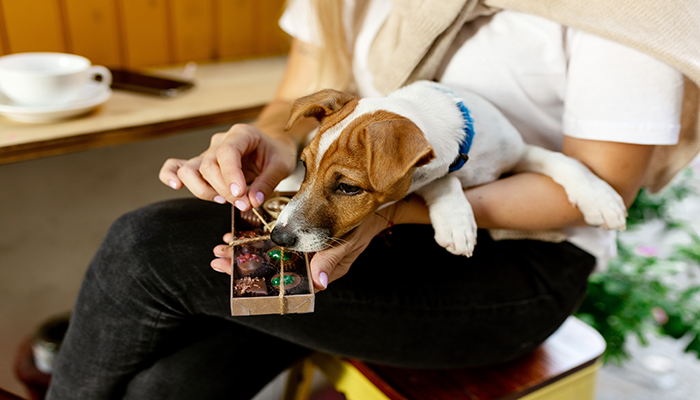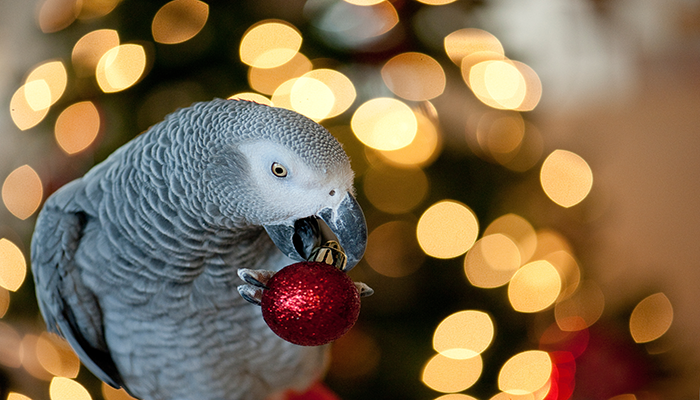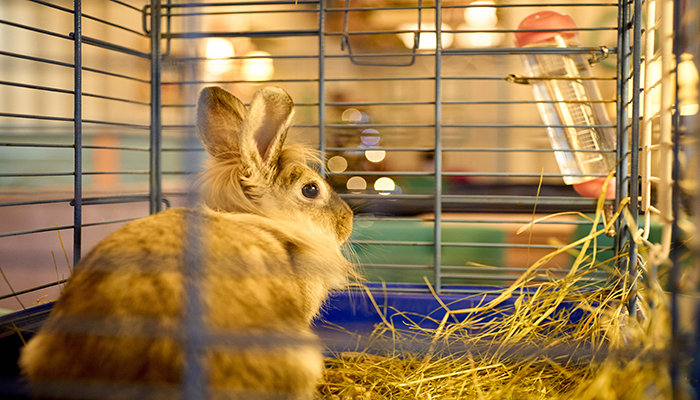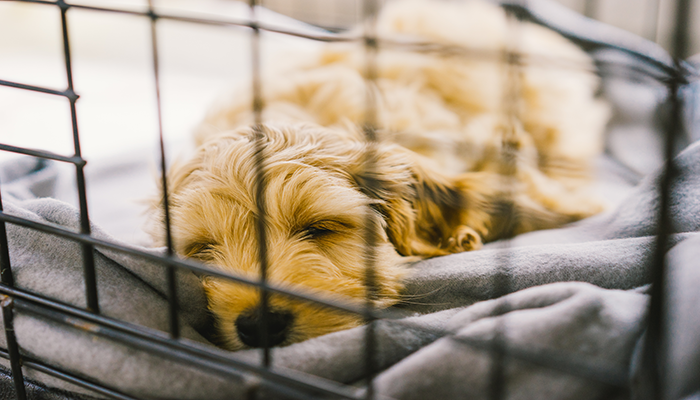Tips for keeping pets calm and safe during fireworks
Read our tips to keep your dog, cat, horse or small pet calm and safe during fireworks.
Read morePublished: 18 December 2024
As the festive season approaches, it’s important for pet owners to keep an eye on their furry friends to stay safe amid the celebrations. From toxic plants to dangerous decorations, there are many festive-related risks that could pose threats to our pets.
To help you prepare, here’s our top pet safety tips for Christmas time.
Christmas food toxic to pets
Christmas plants dangerous to pets
Christmas decorations dangerous for pets
Candles and pet safety
Keeping pets calm at Christmas
Gift wrapping hazards
The aroma of holiday treats can be tempting for pets, but many festive foods are unsafe for them. Be sure to keep the following foods out of reach and remind your guests not to offer cooked bones or table scraps.
When it comes to pets, here’s a good rule of thumb: skip edible chocolate tree decorations, keep advent calendars where they can’t reach, and don’t leave wrapped chocolate gifts under the tree.

If you think your pet ate something they shouldn’t have, take away any leftovers so they don’t eat more and give your vet a call. Don’t try to make them vomit and definitely don’t give them salt water.
Read more on what to do if you think your pet has been poisoned.
Poinsettias, Christmas cactus, mistletoe, holly and ivy are great for adding a festive vibe to your home, but they can be dangerous for pets if they decide to take a bite. Poinsettias are mildly toxic and can cause stomach irritation, while mistletoe, holly and ivy can cause more serious issues for birds, rabbits, cats and dogs.
Lilies (Lilium species) are highly toxic to many pets and can lead to kidney failure, while potpourri poses a significant risk, often causing severe gastrointestinal distress and discomfort.
To keep your pets safe, try putting these plants out of reach or swapping them for pet-friendly alternatives like silk or plastic versions. To learn more about harmful plants, check out our blog, Protect your pets: common toxic plants to avoid.
Real Christmas trees aren’t exactly poisonous to pets, but they can cause some issues. The oils from fir trees might irritate your pet’s skin or upset their stomach if they decide to nibble on the branches. Plus, those pine needles—real or fake—can cause digestive problems if swallowed. And let’s not forget the water at the base of real trees, which can contain preservatives, bacteria, or even mould that could make your pet sick if they take a sip.
Artificial trees might be a safer option since they skip some of these risks, but you’ll still want to make sure there aren’t any small, loose pieces your pet could swallow. Whether you choose a real tree or a more pet-friendly Christmas tree, make sure it’s secured so it doesn’t tip over if your pet gets a little too curious.

Twinkling lights and shiny ornaments are a holiday classic, but they can be risky for curious pets. Cats love to chew on tinsel or string lights, while dogs often think ornaments are toys, which can lead to swallowed pieces or choking. And if you’ve got a house rabbit, watch out—they’re big chewers, and electrical wires can be a real danger. Even pet birds can get tangled in lights, beads and bunting, or nibble on shiny decorations.
Broken glass ornaments can cut paws or beaks, so stick to shatterproof options. Tinsel might look pretty, but it’s super tempting for pets and can cause serious digestive issues if eaten. And don’t forget those edible decorations—wrapped chocolates and candy canes – may look harmless, but pets will sniff them out. Chocolate and certain sweeteners can be toxic to cats and dogs, so it’s better to keep those treats out of reach!
Candles are perfect for adding a cosy feel to those chilly winter nights, but they can be a real fire hazard if pets get too close. Cats love climbing and exploring, so it’s no surprise they might knock over a candle. While dogs, with their wagging tails and curious noses, can easily bump into one too.
Even smaller pets like house rabbits, hamsters or birds could be at risk if their enclosures are near open flames. To keep everyone safe, swap them for battery-operated candles or make sure real ones are well out of reach.

While Christmas is fun, all the extra noise and activity can be stressful for your pets. Dogs, especially breeds like Collies and Shelties, and cats can be extra sensitive to the hustle and bustle around the house. The unfamiliar sounds, new faces, and sudden changes in routine can leave them feeling anxious or overstimulated.
To help your pet feel more at ease, set up a quiet, comfy spot—like a crate or a separate room—where your pet can relax with their favourite toys and treats.
If they’re the anxious type, ask your guests to give them some space, and gently remind children to be calm, allowing your pet to approach on their own terms when they feel ready.

Colourful ribbons, bows, and wrapping paper may add festive cheer to your presents, but they can also double as dangerous toys for pets. If swallowed, these items can cause serious issues like intestinal blockages, which may require expensive surgery to resolve.
Cats and dogs, especially curious kittens and playful puppies, are naturally drawn to shiny, crinkly materials. They explore the world with their mouths, making them more likely to chew or swallow gift wrapping. Pet birds may peck at and ingest small pieces of shiny ribbons.
To keep your pet safe, always supervise them around gift wrapping and quickly clear up any discarded paper, ribbons, or bows as presents are unwrapped.
The festive season is almost here, and a little planning can go a long way in making sure everyone—pets included—has a safe and happy Christmas. With a few simple steps like pet-proofing your decorations and keeping harmful foods out of reach, you can keep things merry and bright without any surprise trips to the vet!
During the holidays, veterinarians often see an increase in visits as pets indulge in things they shouldn’t—like chocolate or festive snacks. Pet insurance helps alleviate the stress of unexpected medical expenses, providing peace of mind while protecting you from hefty vet bills. Get a quote today.
The Christmas break is a busy time for vets. Curious pets just can’t resist sneaking a bite of chocolate or other festive foods they really shouldn’t eat! Thankfully, pet insurance can take the stress out of emergency vet bills, giving you peace of mind and protecting your wallet. Why not get a quote today?
Get a pet insurance quote